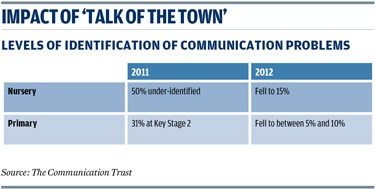How ‘Hello' campaign begins debate on speech
Jo Stephenson
Tuesday, February 5, 2013
The national year of communication in 2011 aimed to improve services and raise the profile of children's speech and language needs

Project
Hello – the national year of communication
Purpose
To raise awareness of the importance
of children’s speech, language and communication, and improve services
Funding
Included £750,000 for strategic projects from the Department for Education; corporate partnerships with BT and Pearson; Communication Trust resources; local resources deployed by local co-ordinators; and support from others including the Department of Health
Background
The MP John Bercow – now House of Commons speaker – was asked by the last government to conduct a review of children’s speech, language and communication needs. One of the recommendations in his report, published in 2008, was to introduce a national year of communication.
The Communication Trust – a coalition of 47 organisations with expertise in speech and language needs – won the bid to manage this campaign, called “Hello”, in 2011. “The aim was to raise awareness, but also to make practical changes to services,” explains trust director Anne Fox.
Action
The “Hello” campaign had various strands. It recruited 200 local volunteer co-ordinators to run activities and champion speech and language issues in their area. They included speech therapists, other professionals, and parents. Fox says the campaign gave them a “focus and impetus to stage a family open day, talk to commissioners or go into schools.” Strong support from government communication champion Jean Gross was also crucial.
The campaign unfolded in stages, with monthly themes to sustain media interest. For example, September’s Back to School theme encouraged schools to take part in “No Pens Day Wednesday” and spend time focusing on listening and speaking.
The campaign included three strategic projects to examine practical ways to improve services. Among these was the recruitment and training of more than 400 “communication ambassadors” to reach out to parents in 29 socially deprived areas. Meanwhile, the Talk of the Town scheme, designed to encourage a consistent, “community-led” approach to supporting children and young people’s speech needs, was tested in a group of schools in Wythenshawe, south Manchester. That led to more staff training, targeted work in classrooms and changes in local policy. The scheme will now be refined and tested in four other areas.
Finally, A Chance to Talk was a training and support programme delivered by trained specialists in clusters of primary schools.
“Overall, ‘Hello’ shows that a focus on communication can improve things but there is still a very long way to go,” concludes Fox. “It needs sustained focus, and a focus on the workforce.”
Outcome
According to the Communication Trust’s evaluation of “Hello” published at the end of last year, the campaign boosted public awareness of speech and language needs and led to a stronger focus on communication in the new Ofsted inspection framework.
Eighty-five per cent of local co-ordinators felt “Hello” was a success, with the majority setting up multi-agency planning groups to focus on communication needs. Seventy-seven per cent of co-ordinators improved systems or structures designed to support and monitor speech needs in their areas, and more than 60 per cent said they had plans to continue these structures. More than half set up systems or structures from scratch as part of “Hello”.
The Talk of the Town pilot resulted in a sharp fall in the under-identification of communication problems. In 2011, 50 per cent of issues at nursery age were under-identified but that fell to 15 per cent in 2012. At Key Stage 2, under-identification fell from 31 per cent to between five and 10 per cent. Parental feedback on the “communication ambassadors” was overwhelmingly positive: 94.8 per cent said they knew more about children learning to talk; and 92.8 per cent said they would do things differently with their child.
The Communication Trust has since launched a five-year strategy focused on working with children’s professionals to ensure early identification of problems and better communication support for all children.

If you think your project is worthy of inclusion, email supporting data to ravi.chandiramani@markallengroup.com




